What are the trends that are the most likely to have a transformative impact on education in the next decade?
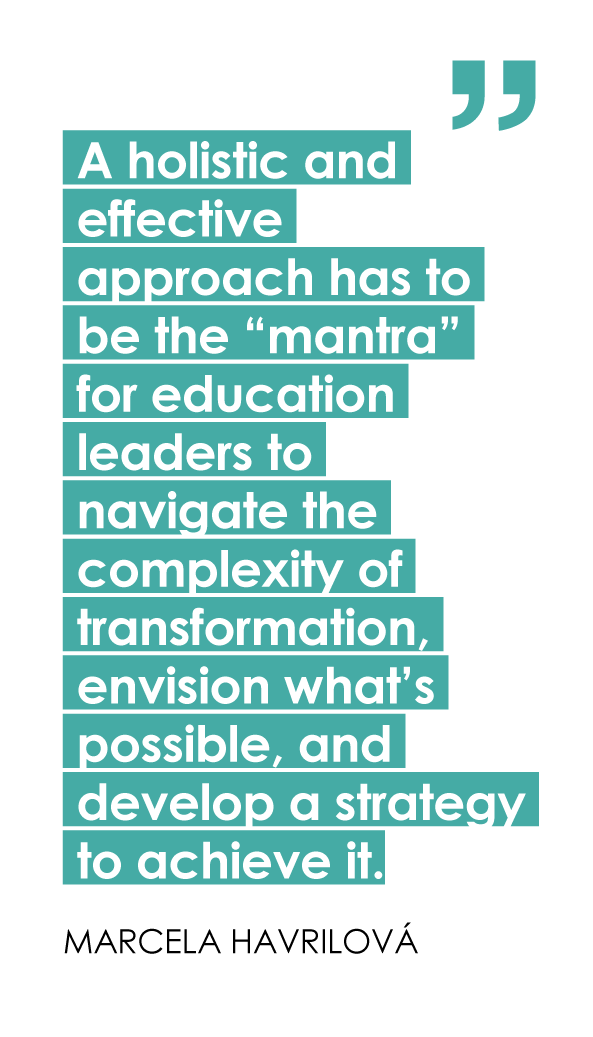 ►Marcela Havrilová
►Marcela Havrilová
In The education of a child requires a complex integration of numerous functions of the school system. Successful transformations are holistic and systemic. A holistic and effective approach has to be the “mantra” for education leaders to navigate the complexity of transformation, envision what’s possible, and develop a strategy to achieve it.
We need to focus on four main pillars: Leadership & Policy, Teaching & Learning, Intelligent Environments and Student & Schools’ Success. A completely new trend is the transition from classic and remote learning to hybrid learning. I see that as a big challenge, because it is really about changing the mindset, it is about seeing things in a new way. We have to help school leaders become real leaders of transformation. We have to focus on educators and to work with their mindset, well-being and professional development. We have to bring professional IT support to our schools. And what I see as very, very important is to bring to our schools equity, inclusion and accessibility for all students. It also means providing accessible technology that can meet the needs of all students looking to take greater responsibility for their learning and development of technology skills.
►Renáta Hall
I can only speak about higher education, as that is my field of expertise. I think that technology will have a key impact. It will impact both the school as an institution as well as the labor market for which schools prepare graduates. Technology, especially AI, will allow automating a number of processes; hence giving more space to more creative management work at schools and for institutional development. It will provide new ways for teaching methods that will enhance learning experience such as virtual and augmented reality, or use of online teaching materials or lectures around the globe. It will save the time spent by teachers on boring tasks, like correcting tests or lecturing basic material, which will be available online. It will also give teachers the space for more interesting parts of teaching such as discussion with students about the importance and use of learnt content or skills. It has the potential to make higher education more accessible as it will allow, for example, adjusting the learning material and methods to the students with disadvantages.
The labor market will also change as a result of the technological impact, especially automation and AI. There will be no more long-term job positions so people will have to be more flexible. Machines will replace a lot of routine jobs, so there will be a need for creativity. We will live longer hence there will be need for people in health care and social services and in general for jobs relying on human touch, that cannot be replaced by machines. With the rise of machines new questions about ethics and about how societies should be run will arise so there will be a need for good quality social sciences. Since machines will be everywhere, all people will have to be technology and IT literate. Higher education institutions should be ready to accommodate all these aspects.
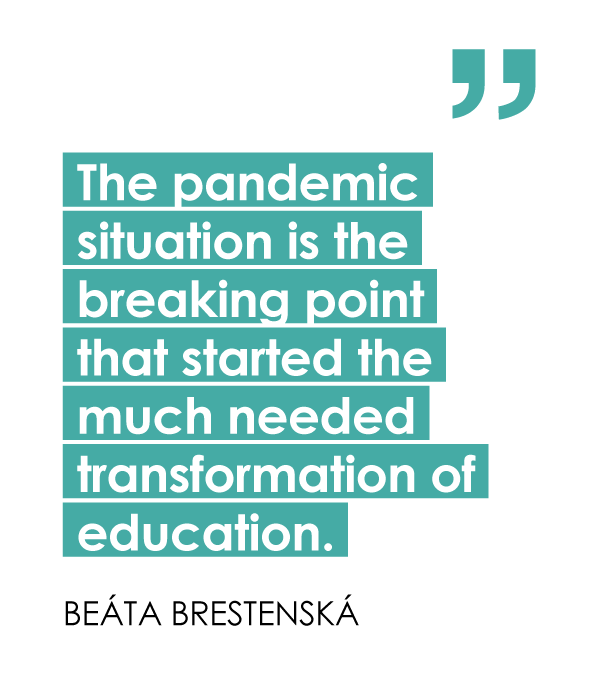 ►Beáta Brestenská
►Beáta Brestenská
The pandemic situation is the breaking point that started the much needed transformation of education. The educational reforms implemented till now have only addressed partial changes in education.
The transformation of education is a complex and dynamic process that needs a vision, concept and a long-term continuous implementation plan with evaluation and innovation stages. It needs open cooperation between educational institutions and the business sphere and a new system for preparing future university teachers.
From my point of view, the following trends are likely to have the biggest impact:
1. Transformation of a “brick-and-mortar” school (of the present type) into a hybrid school (after returning to schools we cannot and will not teach in the traditional way anymore)
2. Investing into quality IT infrastructure is the fundamental building block of the digital transformation for schools and households (a part of EU‘s digital strategy Gigabit Society)
3. UpSkilling – building a continuous learning system directly as part of my professional work (creating conditions enabling to allocate time and resources to further developing my knowledge and skills)
4. Transforming the teachers’ study program at universities to incorporate innovative and creative hybrid education. Open cooperation with IT sector is crucial.
►Michael Cresswell
A lot of transformations have happened in education due to COVID-19. However, some of these recent transformations were already starting to impact education in the 21st century. In many ways, COVID-19 has been a blessing in disguise for the future of education. There are three trends I think that will most likely have a transformative impact on education sooner rather than later:
1. Neo-Pedagogy
The teacher’s role has changed now more than ever. The World Economic Forum has consistently brought to the world’s attention the changing roles, skills and requirements of the current and future workforce. It is a necessity for the teacher to evolve out of an industrial-age approach into a digital world of teaching and learning that supports the needs, technology and skills the leaders of tomorrow require. The teacher is no longer the center of all knowledge who must know everything. Teachers are facilitators and collaborate with learners, who are the driving force behind the learning process. My ideas of neo-pedagogy bring together project-based learning, phenomenon-based learning, blended learning, inquiry, Bloom’s taxonomy, growth mindset and visible learning, to name a few. To do this, mainstream education must evolve from constructivism into connectivism.
2. Learning Design
Linked with neo-pedagogy, how learning is organized and delivered takes on new forms. This is a relationship of pedagogy with new resources, new internet and communication technologies (ICT) and changing contexts of society and each individual learner. Direct instruction can no longer be a one-way road to delivering knowledge. The learning design must support the intrinsic motivation for an interconnected and the highly collaborative and communicative world we now live in. The learning design will primarily support some kind of inquiry-based, learner-led design along with multiple other ways of diversifying the experience. Learning can happen anywhere and everywhere as mobile learning for children and adults seeking further and higher education through MOOCs, micro-accreditations and university degrees all become virtual and online.
3. Online and Distance Education
Online and distance education is able to provide access to learners in ways that other means could not. We see today schools and universities scrambling to catch up to educational online leaders such as: Khan Academy, The Open University (UK) and University of the People. This is about the flexibility of the learning environment and how the learning environment can be adjusted to suit the needs and abilities of the learner. Technology-enhanced learning opens up possibilities for learning that would otherwise not be open to many people. They may not be able to access a conventional classroom, they may not be able to concentrate for long enough to be successful when constrained by an academic timetable, or they may need personal support that is only available at home. There is a range of assistive technologies that can emphasize the potentially life-changing benefits that technology can bring to disabled people when it is designed to take their needs into account. Online and distance education has the ability to allow anyone from anywhere to gain an education while also allowing each individual to connect and understand those different than themselves. Online learners benefit from intercultural interactions and experiences that help to build intercultural skills and confront their own biases.
►František Jakab
One of the major impact trends in education in the next decade will be the ongoing Digital Transformation. In the next several years it is most likely to have a transformative impact on education. Over the last couple of years, the education sector has not been very flexible to accept transformation due to illogical practices, limited budgets, and a lack of coordinated planning. Digital Transformation is emerging into the education system – major changes have already been introduced, and it is likely that we will see a complete transformation of education.
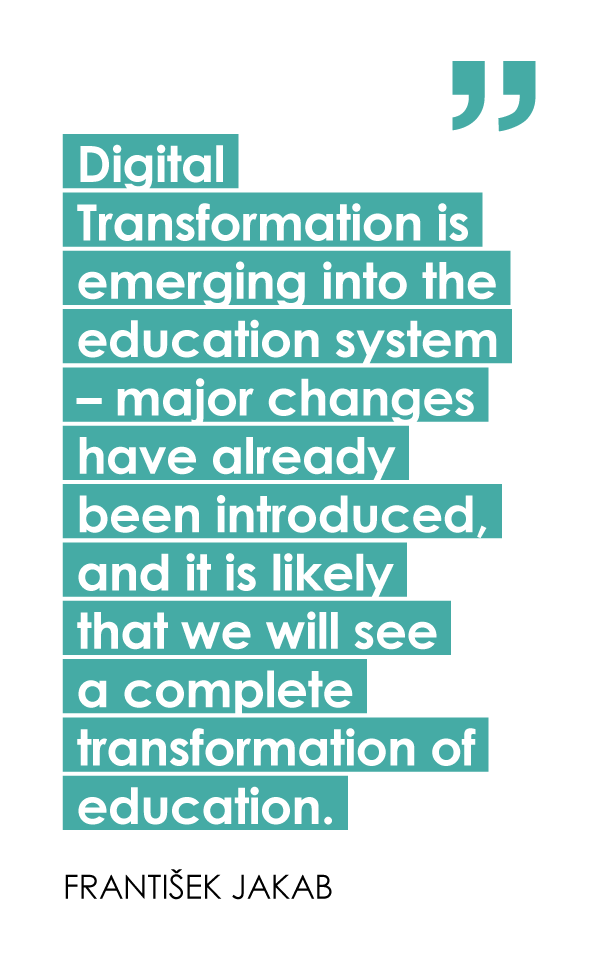
The utilization of novel technologies changes our perception of the education process, while adjusting our ideas, conceptions and goals. Such technologies may transform education both in a formal and informal way. Several aspects have to be considered when introducing innovation into the educational practice: the goals and objectives of education; the context of the educational materials; the learning and teaching methods; also management and policies already existing in education. However, some potential risks and negative aspects of novel technologies still exist, one of these is sustainability. The Digital Transformation in education may be brought to successful implementation if we reconsider traditional ways of teaching and leave behind some established or rather obsolete educational methods.
Marcela Havrilová, Education Industry Lead, Microsoft Czech Republic and Slovakia
Renáta Hall, Expert on higher education
Beáta Brestenská, Vice-Dean at The Faculty of Natural Sciences, Comenius University, Bratislava
Michael Cresswell, Head of School, Košice International School
František Jakab, Director, University Science Park TECHNICOM

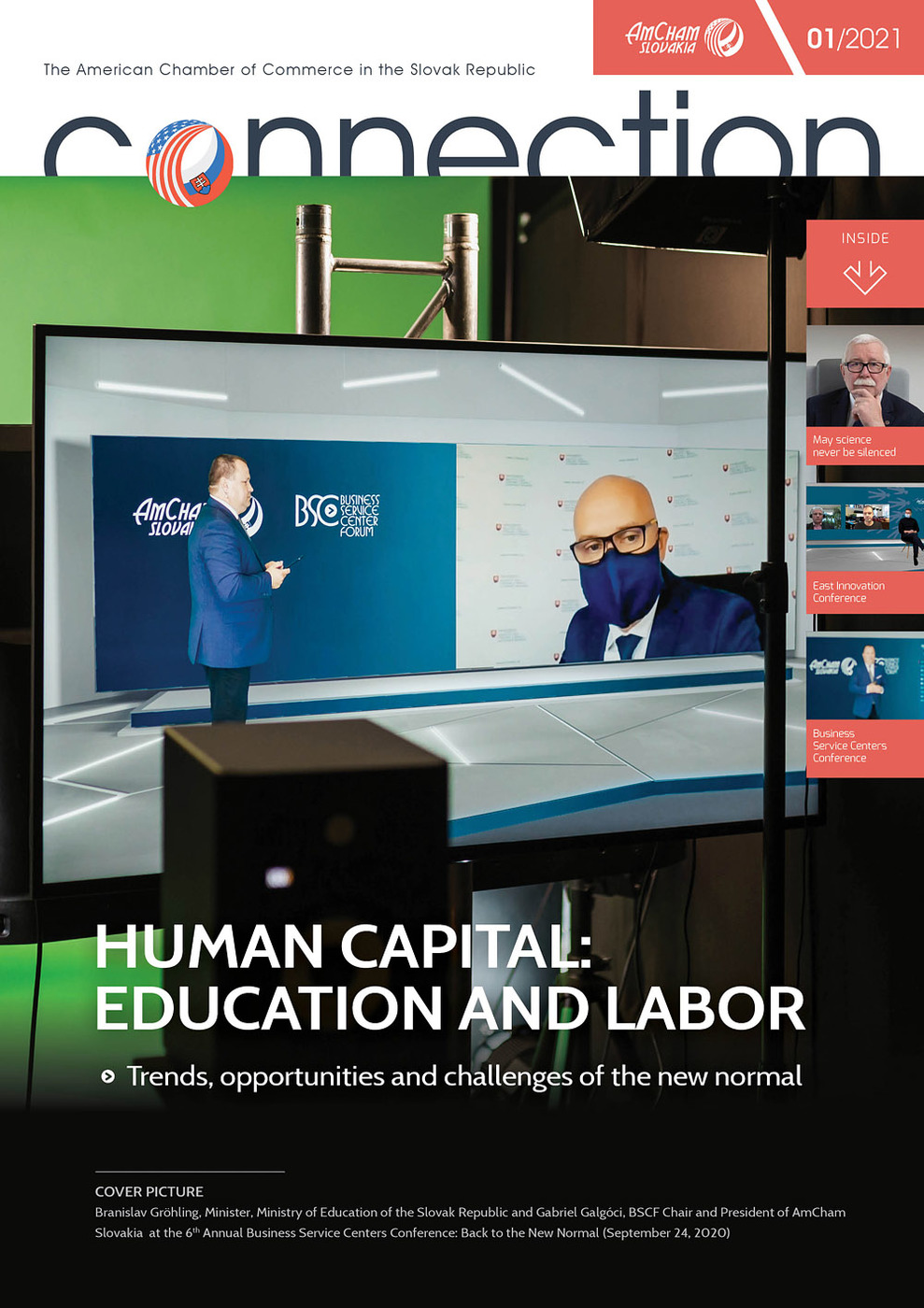
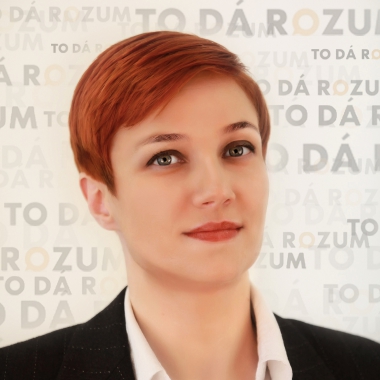



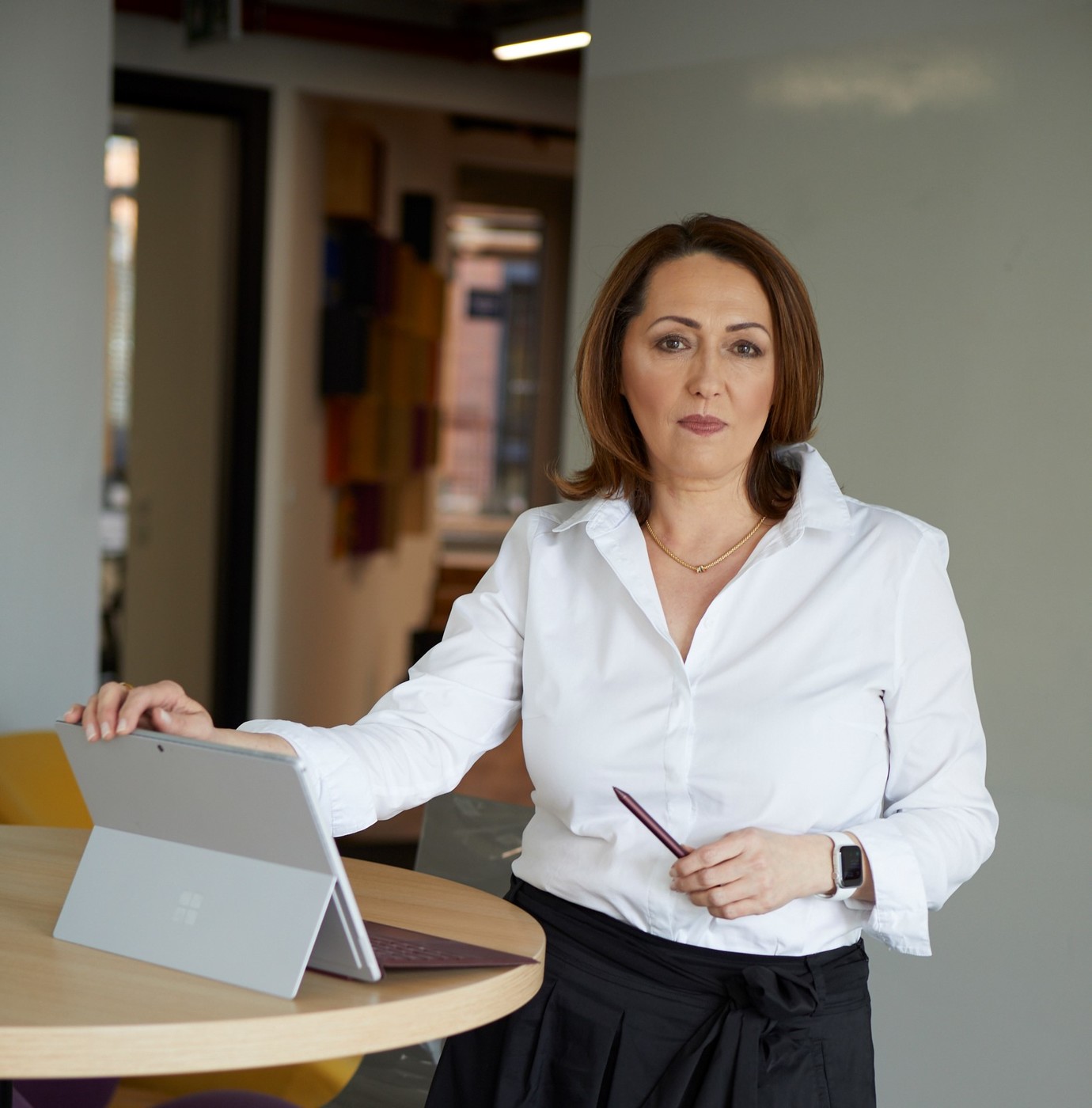
Follow us